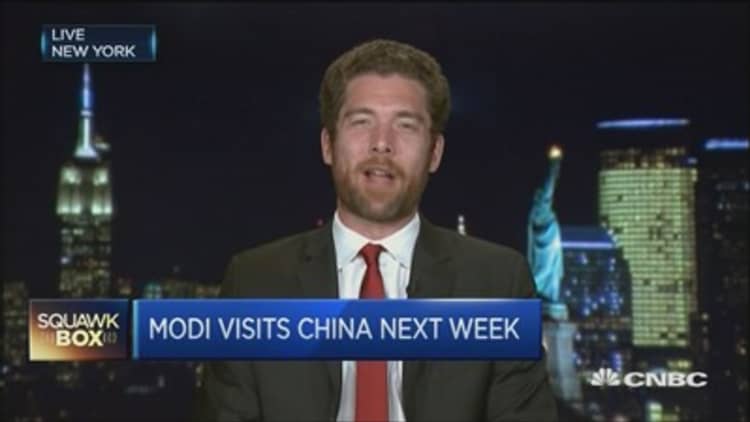Indian Prime Minister Narendra Modi is expected to bang the drum for his "Make in India" campaign during his maiden visit to China this week, but will companies from the "world's factory floor" bite?
Modi will begin his three-day visit to China on Thursday, where he will meet top government officials and corporate leaders in Xi'an, Beijing and Shanghai to discuss greater economic cooperation between the two Asian giants.
"I'm 100 percent certain that selling his 'Make in India' mantra will be Modi's number one push in China," Anil Gupta, Michael Dingman Chair in Strategy, Globalization & Entrepreneurship at the University of Maryland told CNBC.
Introduced in September 2014, "Make in India" is Modi's ambitious initiative to transform India into a global manufacturing powerhouse – a role assumed by China over the past three decades.
Read MoreIndia delays reforms, spooking investors
Since its launch, Modi has pulled out all the stops to court business leaders, most recently traveling to France, Germany, and Canada to personally pitch the campaign.
Gupta says he's "a 100 percent certain that Chinese companies will respond positively."
"As they look to go global, India is widely seen as the largest and fastest growing opportunity," he said.
Xiaomi is an example of a mainland company that has already jumped on the bandwagon.
The low-cost smartphone recently revealed that it was evaluating locations in India to set up a manufacturing unit in order to better serve the domestic market, according to a Reuters report. Xiaomi counts India as its second largest market globally outside of China.
Read More India's desire to be 'open for business'
Other Chinese tech firms such as Lenovo and Huawei are likely to follow suit, says Gupta.
Rajiv Biswas, chief economist covering Asia-Pacific at IHS shared a similar view, adding that Chinese infrastructure equipment firms will also be keen on establishing a manufacturing base in India.
"India is likely to become an increasingly attractive location… for Chinese firms to tap the fast-growing domestic Indian market and opportunities in the Indian infrastructure sector," Biswas said.
"Chinese infrastructure equipment manufacturers are expected to make significant investments into India over the next five years in order to compete in fast-growing market segments such as power infrastructure, communications equipment and railway equipment," he added.
China's Tebean Electric Apparatus Stock Co, which has been supplying power equipment to the Indian electricity industry, recently decided to produce power equipment in India.
Baoding Tianwei Group, which manufactures power transmission equipment, and Trina Solar, a leading global manufacturer of solar equipment, are also planning to establish manufacturing operations in India.

Tables are turning
It may have been inconceivable a few years ago to imagine mainland companies manufacturing in India, the idea no longer far-fetched, says Kerry Brown, director, China Studies Centre and Professor of Chinese Politics, University of Sydney.
"It fits into the narrative of China moving up the value chain. I suppose Modi is pitching the campaign at the right time," he said.
The key comparative advantage India has over its Asian neighbor is low labor costs, adds Frederic Neumann, co-head of Asian economic research at HSBC.
"China's rising cost base means that it is clearing the way for competitors to make some inroads," he said.
"India's wage level is well below that of other major economies in East Asia. True, it ranks ahead of Vietnam and Pakistan, and the former in particular has started to flex its export muscles of late. But, in terms of size, it is really only India that has the depth and potential to pick up the baton from China," he added.
While there is clear potential, both Brown and Neumann highlight the dire needs for better infrastructure before India's manufacturing dream becomes a reality.
"What's needed, of course, is a pruning of regulation, paved roads and a steadier supply of energy. More foreign direct investment would help, too. That, after all, is how China, Asia's other giant, kicked things off," Neumann said.


